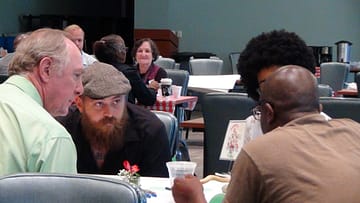Florida faith leaders held a press teleconference immigration issues on Friday, March 9, 2011 and then a Prayer Service for Immigration Justice in Tallahassee, hosted by First Presbyterian Church, on March 17, 2011.
Prompted by concern over the attention Arizona copycat laws are receiving in the current legislative session, the faith leaders felt obligated to state their understandings of how their teachings illumine the current immigration debate. They listed four areas of concern:
1. Restriction of religious expression
Early versions of legislative proposals would have criminalized citizen acts of kindness toward unauthorized immigrant. Current versions would require local law enforcement to remove parents who are unauthorized immigrants from their citizen children, an act some faith leaders consider immoral since immigration status is not an endangerment to children. Concerns remain about the possibility of religious gatherings being disrupted by local law enforcement if the laws pass since they would criminalize federal civil violations and require local law enforcement to make arrests without hesitation. Love for the immigrant is considered central to the commandment to love the neighbor.
2. Destroying Families and Creating Orphans
Florida already has one of the most aggressive set of federal deportation procedures in the country, leaving thousands of children orphaned when their parents are returned to their home countries. These laws would increase and expedite these deportations, leaving a significant unfunded social burden. Already there is a growing number of young people who are caught between their birth country and having been reared in the U. S. from an early age. They need a path to citizenship and the opportunity for a productive life.
3. Economic Disaster
Recent studies count 8% of Florida’s workforce as unauthorized immigrants, some 260,000 plus workers, amounting to $43 Billion in economic activity. It’s hard to see how Florida can continue its recovery if this segment were removed its economy. Moreover, such legislation is sure to bring convention boycotts and to scare away international tourists. Mandating E-Verify for a large proportion of Florida businesses is an unfunded regulation that will increase the prices of services and goods. Anti-immigrant legislation would be costly to all Floridians.
4. Potential for Increased Crime
Co-opting local police to prioritize enforcement of federal civil violations will require significantly increase staffing budgets. Local municipalities will face increased legal costs as they become targets of citizen lawsuits asking for stiffer enforcement. Immigrant communities will fear and distrust police, leading to a lack of cooperative witnesses. Such communities will increasingly become targets of criminal activity that will spill into other communities.
The American citizen and the unauthorized immigrant are both victims of a broken immigration system. Comprehensive immigration reform is needed now. Until then, it is the highest and best of who we are as people of faith and well-meaning citizens of the United States to welcome the stranger in our midst.
 Read the statement: “I was a stranger and you welcomed me” of March 9, 2011.
Read the statement: “I was a stranger and you welcomed me” of March 9, 2011.
Download the homily “Love for the Immigrant” from the Interfaith Prayer Service for Immigration Justice on March 17, 2011.
Download the brochure “We Are Florida” which illustrates the economic benefits of immigrants.
Download the manual on immigration justice ministry, For You Were Once a Stranger: Immigration in the U.S. Through the Lens of Faith.
Modeled on something similar in Utah, leaders in the faith, business and civic sectors have collaborated on issuing The Florida Compact. Go to www.flcompact.com to read and and sign-on to the compact of five principles for developing positive solutions to immigration concerns.
